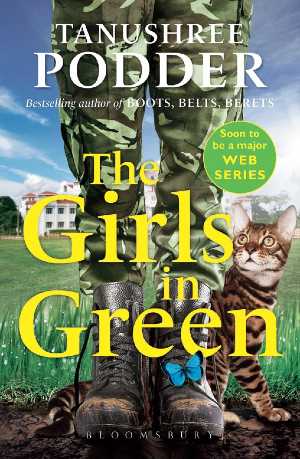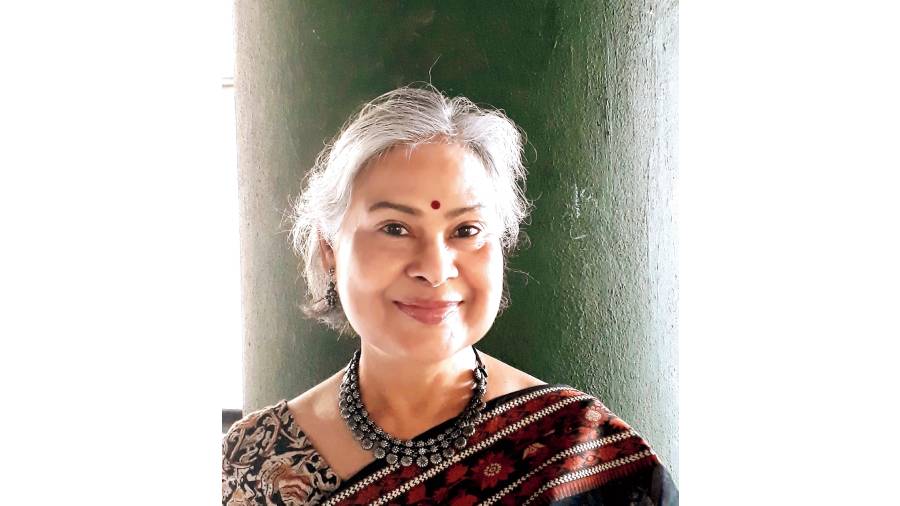Tanushree Podder decided to quit her corporate career spanning eight years to become a full-time writer, and 11 books later, she hasn’t regretted her decision. Her wildly successful book Boots Belts Berets set in an army contingent begged for a sequel and On The Double was born. An author who loves to experiment with genres, she has lived the army life, married to a now-retired officer. Her diverse list of books includes A Closetful of Skeletons, Solo in Singapore, Escape from Harem, Nurjahan’s Daughter and No Margin for Error. However, the army life beckoned her again and this time she has brought a fresh look of the army training centre through the lives of a bunch of girls who struggle to avail the same privileges and opportunities that were presented to men before. Titled The Girls in Green (Bloomsbury; Rs 499), it’s the story of the likes of Billi, Lakme, Shiny and Nutty who are young, restless, ambitious and just being girls at the Officers’ Training Academy, aspiring to join the Indian army. Inspiring and funny, warm and happy, this book has already been commissioned into a web series. For lovers of the cinematic brilliance of DD National shows, one might remember Aarohan, a show based on the naval training academy starring Shefali Shah and Pallavi Joshi. The Girls in Green is a faint and albeit more light-hearted reminder of the show that some of us once loved. We spoke to the author about her book, which is a lovely peek into a world that enamours us all. Excerpts…
A book so deeply set inside a training academy for India’s army — what was your research process like?
I had written a book called Boots Belts Berets, which was, again, about the cadets in the National Defence Academy, which were my husband’s experiences. I created an imaginary lot of characters and basically worked out the story around that. When I did that, a lot of people asked me why I wasn’t doing anything about the women officers who train in our day. I got busy with other books but the shelved idea resurfaced upon seeing the Republic Day Parade led by Captain Tanya Shergill. I was so impressed seeing a woman leading an entire contingent of men, it became a very touching picture for me. Being an army wife myself, it felt like a big step forward.
I went to Officers’ Training Academy, Chennai. Speaking to the cadets and instructors, seeing their training grounds and living quarters, eating in their canteen helped me absorb everything. The women may be fewer in number but I remember an SSB recruiter telling me how the women applicants were far superior to men because of their smartness. They don’t apply because they have no other option. They apply because they are keen on joining the army.

What is your writing process like? Where do you draw inspiration from?
I live my life along with writing, I haven’t made writing the entire purpose of my life, it is just something I enjoy doing. It’s a hobby that I developed into a profession. I enjoy my little walks in the evenings and socialising with my friends, choosing to live life the way I would want, instead of spending all my waking hours in front of the computer. I write in the mornings and the story usually develops as I write. I do have a rough plot in my head but I figure things out as I write. Without a defined structure when I begin, you could perhaps say that I am not very disciplined that way!
I’m a voracious reader, and I have been since I learned to read. My evenings are entirely devoted to reading and there’s not a day that I don’t read. Of course, I don’t think I have any sort of ideal writer whom I have copied or borrowed my voice from. But yes, I enjoy all kinds of writing because I don’t stick to one particular genre of writing or reading. I find contemporary Indian writers to be very interesting, because they provide a big leap in the literary field from where we started, as Indian writers. It’s not that we have not had great writers, but it’s only now that the Indian writers are getting their recognition I feel.
Tell us a little about the web series process. How involved are you in it?
There are no two ways of handing over your baby to someone else. Once they take a story and you’ve signed the contract, it belongs to them. There are clauses that state what can and can’t be changed but the final product always looks and feels different because it has so many more added visions to it. One has to make a choice but I do not want to get involved in the script or screenwriting process because it’s a very specialised job where there are professionals who know best what works for that media. I don’t interfere, I just sign! And that said, the only consolation for a writer is that it reaches a wider audience. I am excited to see it on screen for the first time.
What was your favourite portion to write about in The Girls in Green?
I think I quite loved Lucky’s character. She is just a young woman who wants to enjoy life. She gets into the army with a very different idea of what it would entail. She was taken by the glamour and razzle dazzle of the army life, completely ignoring the strenuous hardships and rigours of training. She has to then reconcile her dreams with the facts.
This book invites a sequel! Is there a plan for one?
I never plan! Also, very funny thing is that once I’ve finished writing a particular genre like I have just written this, and I don’t want to write another military book for a while. I love writing in different genres because of the challenges it offers. After I have finished a book, I take a break, write some other genre, and then come back to it a couple of years later. So who knows? Maybe!
There is increasing political awareness about semantics and the importance of words and what things can and cannot be said. As a fiction writer, there must be a very thin line that you have to traverse when you are writing, being very conscious. So what are these choices that you’ve had to make as a writer writing very feminist prose, about women breaking into a territory that was unheard of before?
I am not consciously trying to be politically correct. In today’s day and age, anything can be construed as politically incorrect. It would become extremely challenging as a writer to do that. Someone pointed out that they had a problem with one of the characters facing weight issues. We often discuss and tease our friends about their weight, don’t we? Why shouldn’t I be able to write about it? Avoiding it wouldn’t be natural.
Tell us about the experience of your online session with Starmark, which was led by Sajita Nair who is herself a woman of the army?
It was so nice, because it was being led by someone who had lived the experience that I had written about. I was fortunate. I wanted Sajita because she also is a writer and is able to express herself very nicely. She agreed and was quite enthusiastic about it as she loved the book. She said, “It took me back to the Academy. I just don’t know how you did it. It is so very true.” Her telling me that I hit the nail on the head was the biggest compliment because it was coming from the horse’s mouth.
One tends to be unsure till the book goes out and people read it. I hear the echo of that thought from many places now and it sort of validates my entire thinking and the art.
And my last question, what next?
I have had three releases consecutively this entire month, and all three different genres! One is Spooky Stories (HarperCollins India) and one is An Invitation to Die (HarperCollins), which is the third instalment in the murder mystery Colonel Acharya series. It’s been a maddening time for me so next on the list is to catch a breather!










